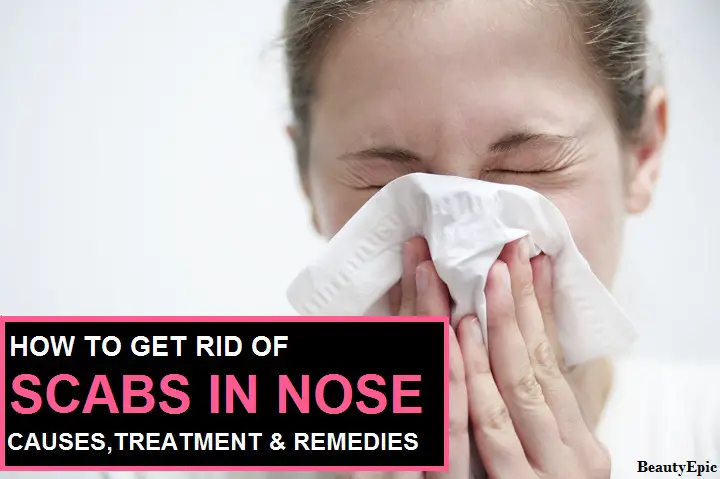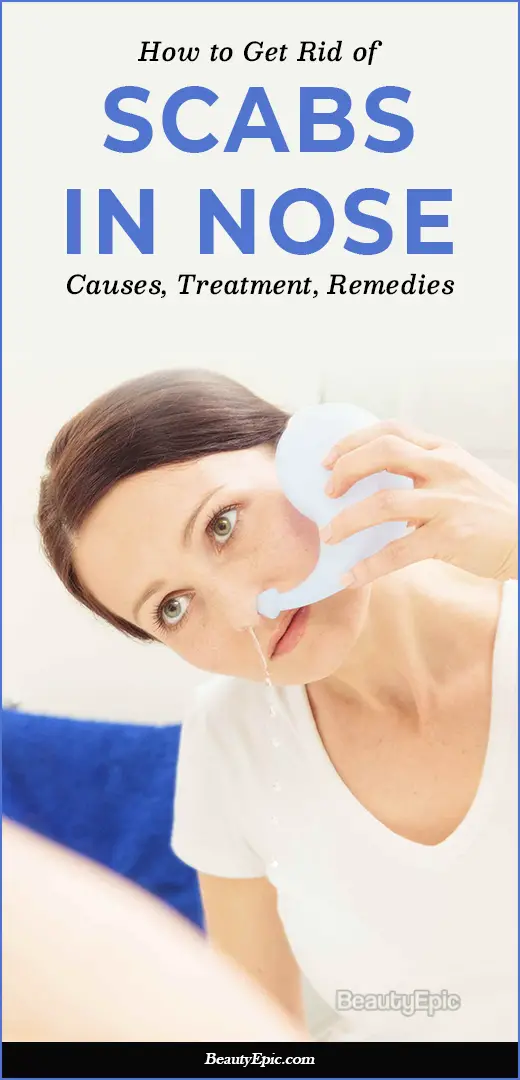
Important: This article is for informational purposes only. Please read our full disclaimer for more details.
Nasal scabs could be mucus in the nose that has dried up or could also be the sores healing up and forming scabs. They could be a precursor to cancer if they persist, could also be a simple infection or just the blood having dried up much inside the nose after a bleeding. We will be discussing every aspect pertaining to scabs in the nose here.
Article Contains
They might be just a symptom of an infection. They could be in very rare cases, early signs of cancer. There are several problems which might be causing scabs. They keep reappearing like boogers in the nose.
What Are Nasal Scabs?
- Scabs are basically fibrin which forms in a blot clot. They are sometimes referred to as doctors by the term ‘Organic Bandage’. They may lead to itching as they are caused by the regeneration of the skin
- Dried mucus also forms scabs, but these can easily be removed. They could also signify healing sores inside the nasal cavity, in which case it is better not to try removing them lest we could contract an infection. People who suffer from a lot of nose bleeding every now and then particularly suffer from them.
- They could most probably be caused by infections. Weather changes also expose us to the risk of getting scabs in our noses. Having sores in our nostrils could also be the reason. Let’s now discuss the causes for scabs in detail.
Causes of Scabs in Nose:
1. Nasal Bleeding: Bloody scabs are formed in case of nasal bleeding. The bleeding itself could be because of arteries being hard, a broken nose, conditions associated with hemophilia, tumor in the nose, or leukemia.(1)
2. Operative Procedures: Surgeries such as those for correcting the nasal septum or the sinus could often cause wound scabs. When the wounds are healing, large scabs may appear. In this case it is best to discuss it with the ENT specialist.(2)
3. Allergies like Hay Fever: In this case, the mucus membrane becomes severely inflamed, the nose is running or blocked, and there is throat itching. If we attempt to pick our nose in this case, the inflammation results in scabbing.(3)
4. Rhinitis: This also causes inflammation in the nose and leads to swelling of our nose’s anterior cavity leading to blocked/running nose. It also causes scabs to occur in the nose.(4)
5. Sinusitis: In case of sinus, not just the inflammation causes scabs but even the patients start picking the nose to get some relief and cause bleeding at times. This bleeding also becomes another cause of the scabs.(5)
6. Cold Sores: These are also a viral infection and when they start drying up they also become painful scabs in the end.(6)
7. Drug addiction: In case of addiction to certain drugs especially those inhaled through the nose, like cocaine, scabs tend to develop inside the nose lining.(7)
8. Staph A infections: When we are attacked by bacteria called Staphylococcus, it could lead to development of scabs in the nose.(8)
9. Sunburn: When our skin close to the nostril entrance is exposed to sun without a sunburn protection film on, we have a possibility of developing scabs at this opening.
Now that we have seen the various causes of scabs in our noses, let’s find a suitable solution to this irritating problem.(9)
10. Picking Nose: When we insert something inside our nose (usually the fingers but sometimes a sharp object), to clear the nasal passage, it might cause scars and sores to form. Doing it habitually may even cause wounds and large scabs.
11. Dryness In Nose: When the nasal cavity is dry, mainly owing to dry and hot weather conditions, scabs are formed which erode the mucus membrane in the nasal septum. Usually these scabs are very little, but they cause burning during the exhaling process of breathing.
12. Nasal Herpes: If we are suffering from a viral infection caused by herpes, we may experience scabs in the nose. Herpes is an STD (sexually transmitted disease). In this case yellowish/greenish scabs are observed.
13. Medicines: Some medicines make the nose dry and may cause scabs in the nose.
14. Cancerous Intimations: If the scabs are hard and crusty, they could possibly but very rarely be signs of cancer. If they show no sign of leaving it is advisable to get them checked.
How to Get Rid of Scabs in Nose?
1. Warm Compress
Take some hot water and soak a towel in it. Dab the affected area and slightly compress it. This is a great way for getting some relief from the discomfort.(10)
2. Stop Picking Your Nose
This would most likely be the most effective way of solving the problem in most cases.
3. Using Antibiotic Soaps
Use antibiotic soaps to wash the area around the nostrils, including the mouth to prevent them from spreading.
4. Saline Solutions
It can be used in the removal of scabs. But, do not try this in case of cold sores.
5. Avoid Smoking
Avoid Smoking as the smoke causes inflammation in the mucus membrane and causes scabbing. The smoke also creates a favorable breeding ground for bacteria.
6. Don’t Blow Your Nose
Avoid blowing the nose a lot. It may cause bleeding and inflammation on the scabs and will only cause more pain.
7. A Humidifier
If you have a dry nose, then using a humidifier would be a nice idea to prevent scabbing.
8. Vaseline Petroleum Jelly
If the scabs are occurring on the nostril tips or near, the surrounding areas must be kept hygienic and properly moisturized. Vaseline petroleum jelly can be effectively used for this purpose.
9. Avoid Allergic Substances
Avoid anything that you are allergic to, like molds, pollen and fur.
10. Using Baking Soda

Baking soda has antiseptic characteristics which will help ward off any kind of infections. Take some baking soda and mix it with a little water and apply this solution on the scabs. Let it dry and rinse with plain water.
11. ACV – Apple Cider Vinegar

Apple cider vinegar stimulates cell growth and helps in maintain the skin’s pH balance. Take 1-2 tsp of apple cider vinegar and mix it with a bowl of water. Use a cotton to apply it on the scabs. Wash the area with plain water after 20-25 minutes. Alternatively, you could also use tea-tree oil.
12. Garlic
Garlic helps fight infections owing to its antimicrobial characteristics. It is very effective in healing scabs in most cases. To use garlic, we could boil it in water and apply that solution to the affected area once it has cooled.
13. Honey
Applying honey on the wounds or the scabs will help them heal faster because it is a great antiseptic.
14. Epsom Salt
It can help calm the scabs. Try soaking the nasal scabs in water for a while and then add Epsom salt to the same water.
15. Antibiotics
Antibiotics like bacitracin or Neosporin might be prescribed by the doctor. You may also be prescribed Ponaris Oil as a home treatment.
16. Cauterization
If the scabs keep persisting, the doctor will perform cauterization which will boost fresh cell-growth and make the scabs go away. It is usually done as a sort of last resort when no previous remedy has been useful.
Since we have seen the causes and remedies of scabs in the nose, we can effectively see them off.
You Might Also Like:
- Headache And Nosebleed: Causes, Treatment, And Prevention Tips
- Does Ice Make Your Nose Smaller?
- Red Spot On Nose: Causes And Treatments
- Why Do I Wake Up With A Stuffy Nose?
- Can Teething Cause a Runny Nose and Sneezing
- 10 Easy Ways To Clear Stuffy Nose With Home Remedies
- The 8 Best Essential Oils for Stuffy Nose
- Yoga for Sinus: 6 Best Yoga Poses for Sinus Relief
- How to Get Rid of Blackheads on Nose Naturally at Home?
- What Age Can You Get A Nose Piercing?
- How to Take Out Nose Stud with Flat Back?
- Why Is My Nose So Oily?
- Having A Pimple In Nose ? – The Causes And Natural Treatments?
- How to Cure an Ear Infection Fast with Tea Tree Oil?
- How to Use Garlic for Ear Infection?
Image:- 1
















